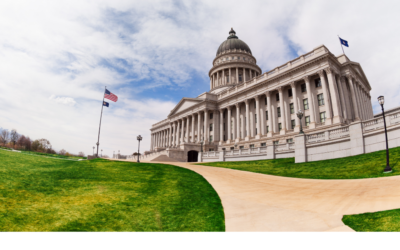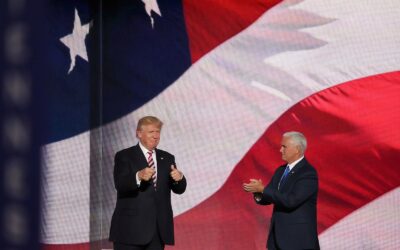Deidre Henderson: Need for Women’s Voices in Politics
Deidre Henderson Started Out Working with Jason Chaffetz on His Campaign

I first met Deidre Henderson when she was helping out with Jason Chaffetz’s seemingly impossible run against 12-year incumbent Chris Cannon. Somehow he won at State Convention and the primary even though he had no name recognition and he was being outspent on campaigning 10:1.
Deidre describes the campaign, “We were going against the grain. Everybody thought we were a bunch of idiots. We had a strategy and we had to turn things on their heads because we didn’t have the resources that the other campaigns had. We had to do things differently. I remember our conversation right after the primary, we were like, ‘That was brilliant. That was incredible.’”
The Change from Senator to Potential Lieutenant Governor
I remember a phone conversation not long after my wife Becky Lockhart had passed away, I told Deirdre that she would be the first woman to be Senate President in Utah. However, I was wrong. Now she may be the second woman to be elected lieutenant governor in the state of Utah.
Deidre has loved her time in the Senate:
“I am excited about the process. I love the legislative process. Part of me is really sad to leave that. I am a big believer that the more people that are involved in the political process the healthier it is. I love that aspect of lawmaking. I love the interaction with constituents. I love the messiness of the process: the refiner’s fire that bills have to go through in order to have it come through as a final product. It is an incredible process and it is something that is really unique. It is something that I hold sacred and dear. I hate to leave it.”
However, the opportunities serving as lieutenant governor are also exciting because it would give her a chance to have a bigger impact in the state:
“I am excited about the prospects of having a statewide voice and still really working closely with members of the legislature in the process to implement the policy ideals of the Cox-Henderson administration. It is exciting to be an example and voice statewide instead of just in one of 29 senate districts.”
Invitation to Run With Spencer Cox

Deidre didn’t become involved in Spencer Cox’s campaign until the Saturday after the legislative session ended:
“We went down to Fairview that Saturday to meet with Spencer. He took me on a tour of Fairview. It is a beautiful little town. He literally showed me every house and every building that his ancestors have ever lived in. We went and saw all that stuff and then he took me to their home. We sat down and had a really frank conversation. He asked me to join him.”
This was difficult for Deidre though because she had just filed for re-election. It was a difficult decision but after discussing it with her family, she agreed to run with Spencer. Things got tricky though when it came time to announce their candidacy:
“We were going to announce the next Wednesday and that day there was an earthquake. We decided to postpone the announcement. I didn’t want to postpone my withdrawing from the race because I wanted to give people an opportunity to put their names forward to run for it. I withdrew from the race that day. I was hoping to give people the opportunity to file who wanted to file. We didn’t know when we would announce but we did announce the very next day.”
Deciding to be a running mate for Spencer Cox was an easy choice for Deidre:
“That is part of the reason why I decided to join him not just because he is a really incredible person, very principled and kind and a person of integrity. He also made it very clear to me that he is looking for someone who can be a partner and have a say in policymaking. I love policy making and it is a strength of mine.”
Role of Lieutenant Governor
One benefit of running with Spencer for Deidre was that Spencer has experience being in the role of Lieutenant Governor:
“In the past, there were some governors who would sideline the lieutenant governor and put them in a corner and keep them isolated and out of the loop. He has been in the role and so has Gary Herbert. They come with that understanding what things worked and what things did not.”
The role of lieutenant governor has been changing over the past few years. In recent years the lieutenant governor has had more responsibility. 20 years ago it was perceived that the lieutenant governor was the ribbon cutter. It was almost ceremonial in nature. The lieutenant governor does get things to do. If you’ve been lieutenant governor, you understand it and you give them good things to do.
Deidre talked about the responsibilities of a lieutenant governor:
“There are five statutory things that a lieutenant governor has to do. But the other things are what the governor wants you to do. That can include being the chair of a variety of boards and commissions. The lieutenant governor is the keeper of the state seal. They oversee elections which is a very important job. A lot of states have a Secretary of State that oversees elections. The lieutenant governor does oversee to make sure they are executed properly, fairly, and safely. People are secure in the knowledge that their votes are going to count and that the people who shouldn’t be voting aren’t voting.”
Chaotic Spring
Deidre’s spring was whirlwind from campaigning to special sessions in the Senate to redoing the budget. And she was also a full-time student at BYU working on her degree in history:
“I want to graduate next April but I’m trying to figure all of that out. I did drop my summer classes because spring term just about killed me. The week of the special session was also final exam week for me. I am a history major. There is a lot of writing and research. I had final research papers and final exams that week. It is seven weeks and it is really condensed and really intense. I had a full load and on the day of the special session I had to take 3 final exams by midnight. That week just about did me in.”
Also, during this time she was traveling all over the state to visit citizens:
“Our goal was to visit all 248 cities in Utah. Before they came on the campaign they had already gone to 205. We had 43 left to go. I was in the middle of doing that with Spencer. I loved our city tour. It was meeting one on one with people. It was about informing ourselves of what the needs were.”
Campaigning in COVID19
Deidre has worked on campaigns and campaigned for herself in past years. However, COVID19 created a campaign unlike anything she has ever seen:
“It is so different now. I am no stranger to campaigning. I’ve been doing it for 12 years. This year is unlike anything I’ve ever experienced before. As soon as I was brought on to the campaign in mid-march, we all of a sudden had all the caucuses canceled. We just deal with delegates from two years ago. No in-person meetings.”
And then she was quarantined for two weeks after a Senator tested positive for COVID. Then her daughter came home from a mission and she had another two weeks of quarantine. The campaigning switched to lots of phone calls and tele town halls:
“We did some Zoom halls. When you are trying to interact with an audience that you can’t see. You have no idea if you are hitting the mark or if you are totally missing it. It is hard because that is the part that I love. I love connecting with people. I love meeting people. I love getting to know people. I am good at it. When you can’t do that, it makes it tough. We did the best we could.”
Once things opened up again, they still tried to be careful because they didn’t want to risk spreading COVID19:
“We were able to do some limited in-person things. But it was very limited. We had to be very careful and make sure that we didn’t have too many people and made sure we social distanced.”
Once COVID19 is over, Deidre is planning to do the city tour as lieutenant governor so she can get to know the people.
Vote by Mail
Deidre appreciates vote by mail because it ensures that more people cast their votes. Vote by mail led to a much higher voter participation rate in the state of Utah:
“In 2016 Governor Herbert and Spencer Cox won the Republican nomination with 71% of the vote. Spencer and I, we won it with 36.5%. However, we actually got more votes by a lot than what Herbert and Cox got in 2016 when they won by 71%. Vote by mail was a massive turnout. I think that is a good thing. The more people involved in the political process the healthier it is.”
Deidre is in favor of making the voting process accessible for everyone:
“There is a traditional viewpoint I’ve encountered that voting should be hard. That it should not be accessible to everybody. Someone has said, ‘You should have to climb a mountain, swim an ocean, and wrestle a bear in order to be able to vote.’ I categorically disagree with that. It should not be inaccessible to people. It should be accessible. I think vote by mail helps people be more informed. They can sit and Google stuff before they fill out their ballots.”
The current voting procedure is secure and Utah does a good job of using vote by mail:
“I believe that we can have good accessible elections and secure elections at the same time. They are not exclusive. I think that we can have better elections that are secure. We do a good job in the State of Utah. We set the bar.”
Vote by mail helps ensure that the lists of voters are more accurate. Deidre had the chance to sit down with the Utah County Clerk, Amelia Powers, to talk about vote by mail:
“You run into problems with voter fraud when you have expanded absentee ballots, not when you have vote by mail. When you are relying on someone to physically come to your location, check ID, you aren’t keeping up with the lists. It is not important to you that dead people and people who have moved are taken off your lists. With vote by mail, the country clerks are incentivized to make sure that their lists are up to date. They have people scouring obituaries. We hooked up with the DMV a couple years ago so that it automatically changes your voter registration when you change your address on your driver’s license. We are doing things to make sure those lists are up to date.”
Women in Politics
I shared with Deidre the story of my late wife, Becky Lockhart and how parents would come with their daughters and ask to take a picture with her. With these experiences, she realized how powerful it is seeing a woman in places where they are not normally seen. There is an aspirational thing for them to see this. It is powerful.
Deidre shared her feelings about women in leadership:
“There is an old adage that you can’t be what you can’t see. I truly believe it. There is something powerful in seeing possibility. I decided a long time ago during some moments of intense frustration that my public service was not about me. If I never get anywhere else it is ok. It is not about me. It is about me hopefully doing what Becky did, maybe pulling down a few bricks off wall. Making the way will be a little smoother for those that follow me. It is powerful.”
Need for Women’s Perspective
Many times people will tell you that it doesn’t matter what someone’s gender is when it comes to leadership. However, Deidre stressed the importance of having women’s perspective:
“I think we have to get away from the idea that it doesn’t matter if you are a man or a woman. It doesn’t matter if there are hardly any women in elected offices in Utah. I am telling you it absolutely matters. It does matter. There are different perspectives. It is like looking out of one eye. You can see things out of one eye. You can see good things. You can see things that are really there. But you don’t get the complete picture if you don’t look out of both eyes. We haven’t been looking out of both eyes in our state government and we really need to. We need to look out of both eyes.”
An example of the need for a woman’s perspective was the recently proposed food tax:
“Like the food tax. When I was first elected to the Senate, my colleagues started talking about raising taxes on food. My question to them was, ‘How many of you have been to the grocery store with a calculator?’ Less money means I put less food in my basket. I’ve been there. I understand that. That was a perspective that was missing in those back rooms. It is important. It does matter. We need to just stop saying that it doesn’t.”
Need for Unity
Deidre hopes that as a state we can become more unified:
“This campaign, this election was very different where Spencer and I won with less than 50% of the vote because there were so many great candidates in the field. We need to unify. I pride myself on trying to be a unifier. I try to do that in all aspects of my life. I don’t always succeed.”
Part of unifying is understanding the people and Deidre is ready to listen:
“I like to listen to people. I like to hear alternative perspectives because I think that is healthy. I want the Republican voters in the state of Utah to know that I hear you and I want to represent you. I want to listen to you. I want your support. I know that we need to earn it. I want to do that. I hope that we can. I hope that they can help us do that. It is really important. Our party has been so divided in Utah for so many years. It is really unfortunate. I feel like if we don’t unite, we are going to be in trouble soon.”
You Can Get Involved in Politics
Deidre shared how it is possible for anyone to get involved with politics:
“What I love about our process and our system is that average regular folks can get involved. People like me who just started making a few phone calls a few years ago can get involved and can go places. You don’t have to have a famous dad. You don’t have to have a million dollars. You can just be a regular person who can then end up doing some pretty incredible things because of our system and that is the beauty of it.”
Lessons Learned:
- Deidre is running as number 2. In the past, she has run for senate and run on her own. Now she is running as a running mate to Spencer Cox following his lead, which is a different experience for her.
- Deidre has to be ready if anything should happen to step in as governor.
- This election has been a different experience with the coronavirus. The zoom calls and phone calls don’t make up for being able to meet people face to face. She is planning to go visit all the cities once COVID19 is gone.
- Vote by mail is good and allows more people to vote.
- Women in politics are important and you can’t be what you can’t see.
- She wants to make the way smoother for other women. Having women in the room makes for better decisions.



